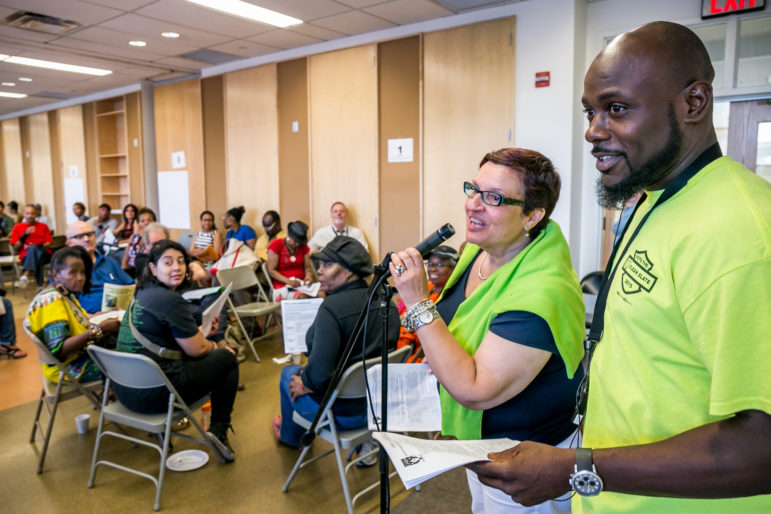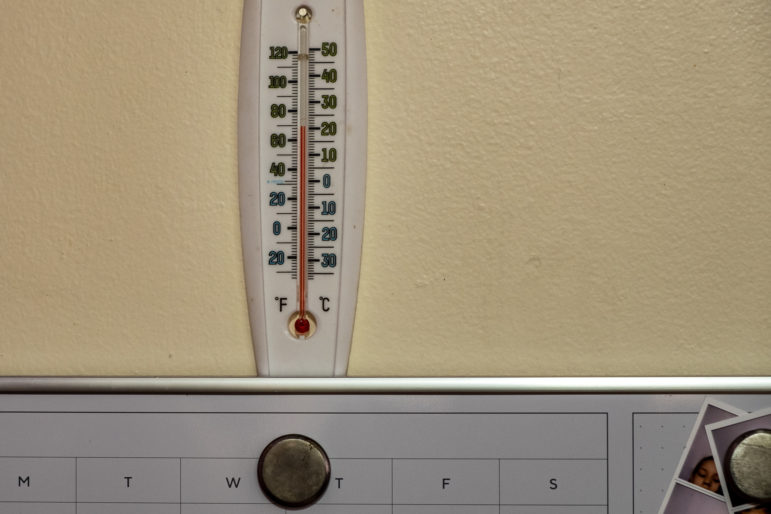
Adi Talwar
Carmen Vega-Rivera, a tenant leader with Community Action for Safe Apartments, seen during the run-up to the Jerome Avenue rezoning. She cited that experience in her testimony to the Charter Revision Commission.
Citing the affordability crisis, dozens of residents, advocacy groups and elected officials testified Thursday that the Charter Revision Commission’s staff recommendations do not go far enough on land use and planning.
The hearings are being held after the Commission released a preliminary report in April with staff recommendations for the issues the panel should consider as it moves toward proposing ballot questions for November.
The staff focused on increasing police accountability, improving the voting system, and making the city budget more transparent. The last time the City Charter received a comprehensive revisal was in 1989.
On land use, the commission made two key recommendations in its preliminary report. The first would provide more time and opportunities for community boards and borough presidents to review and comment on applications before the ULURP is triggered. And the second recommendation was an extension of time for Community Boards to review applications in July and August.
On planning, the commission recommends that various city plans and projection should be clarified after critics said city planning reports were “inconsistent and difficult to follow.” It stressed those plans should address “future planning challenges, such as neighborhood rezonings” and should “ensure that the public and other stakeholders are involved in these plans,” in the report.
But advocates say those proposals do not go far enough.
Community Action for Safe Apartments member and leader Carmen Vega-Rivera testified on her experience with the Jerome Avenue rezoning, which was approved last year by the City Council and she says involved a process that was unnecessarily complex and frustrating.
“The Jerome Avenue Rezoning is a perfect example of how flawed and ‘broken’ the current system is, due to a lack of responsible ‘displacement’ assessment, transparency, community engagement, and substantial commitments,” said Vega- Rivera. “Despite the numbers, the city refuses to acknowledge the problem and ignores our concerns.”
Vega-Rivera said one way the process could be improved was through the technical manual that guides the calculations for environmental impact statement reports.
Jonathan Rabar, a member of the Manhattan Community Board 5 Land Use Committee, testified that the City Council should have the power to amend the draft scope. The draft scope is a city document that maps out the environmental impact study that must commence before the project can move into the city’s Uniform Land Use Review Procedure, or ULURP.
Manhattan Borough President Gale Brewer said in her testimony that she wanted more emphasis on the pre-planning aspect of the rezoning because ULURP does not give enough time to the communities and Borough President involved. Brewer described the current approach to planning was “ad-hoc.”
The City’s Planning Process
Details here.
Brewer said she wanted to see the removal of deed restrictions go through a ULURP process. Another issue she mentioned was for zoning lot mergers and easement agreements to be made public. (Zoning lot mergers permit the joining of two or more existing lots that are contiguous for at least 10 linear feet and a easement agreement is when a property owner gives a entity temporary or long-term access to the property without transferring ownership.)
The third issue Brewer raised was clarifying the process and standards for special land-use permits. Special permits applications for modifications are reviewed by the DCP staff to determine if a modification is “major” which requires a ULURP or “minor” which needs a CPC vote to be approved. Both deed restriction and special permits have been contentious issues in the Two Bridges development project.
The Thriving Communities Coalition, which represents dozens of housing, tenant and justice advocacy groups and elected officials across the city, said in a press statement the Commission’s latest proposal outlines only modest changes to the City’s land use processes and “its draft proposal leaves out crucial components and instead appears to call for minimal coordination of the labyrinthine and uncoordinated plans that consist of the existing system.”
The coalition has been pushing for its own set of proposals which includes changes to the environmental review process, community board reform, use of public land for public good, and ULURP for NYCHA, and comprehensive planning, which were not included in the Commission report.
What is Comprehensive Planning?
What you need to know, in three minutes:
The commission’s report laid out other recommendations. For more cost-effective city elections, the commission recommended implementing the Ranked Choice Voting method, which is when voters rank their candidates based on their preference. The candidate with the fewest ballots is continuously removed from each round until one candidate with the majority votes remains on the ballot.
On the Civilian Complaint Review Board (CCRB), which investigates complaints made against members of the NYPD, the commission recommended the City Council be given power to appoint some members to the CCRB; currently the Mayor appoints all 13 board members. It also would require the Police Commissioner to create disciplinary guidelines for police misconduct. It would also allow the CCRB the power to investigate and recommend discipline when there’s evidence that an officer has given a false statement during a CCRB investigation and delegate subpoena power to high-ranking CCRB staff (currently only the Board has power).
The report also calls for giving power to Borough Presidents to require information from city agencies, increasing transparency for the city’s budget for various city programs and/or initiatives and giving the City Council the power to advise and consent on the mayor’s appointment of the Corporation Counsel.
The Charter Revision Commission is scheduled to release its final report this July and the public will vote on those changes to the City Charter on Election Day, November 5, 2019.
Meanwhile, the City Council is considering a menu of legislative changes to the city’s planning process, including:
• Int 0252-2018, sponsored by Councilmember Antonio Reynoso, which would require the city to include environmental mitigation strategies among the commitments tracked as part of the publicly accessible online database tracking commitments made in relation to uniform land use review applications.
• Int 1487-2019, sponsored by Councilmember Francisco Moya, which would require the Department of Housing Preservation and Development to study secondary residential displacement effects of recent rezonings, and
• Int 1531-2019, also sponsored by Moya, which would require the city “to report on the actual impacts on public school capacity and overcrowding in areas affected by neighborhood rezonings four years and ten years after each such rezoning.”
Watch the Thursday night hearing below:








2 thoughts on “Advocates Push Charter Commission for Bolder Action on Land Use”
NYC’s is too large, and our neighborhoods are too varied for city-wide Comprehensive Planning.
Pingback: May 24, 2019 – Weekly News Roundup - New York, Manhattan, and Roosevelt Island | Manhattan Community Board 8